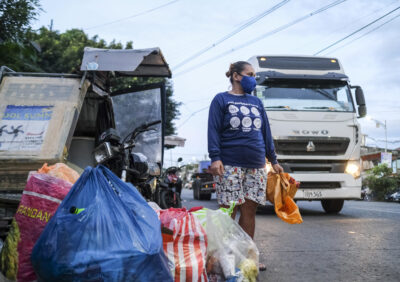Each day, plastics leak into the waters around the more than 7,500 islands of the Philippines, driven by rising production and consumption of single-use plastics. USAID’s Clean Cities, Blue Ocean (CCBO) program is engaging across the Philippines to stop the flow of plastic pollution to the waters within and surrounding the country.
Engagement Sites
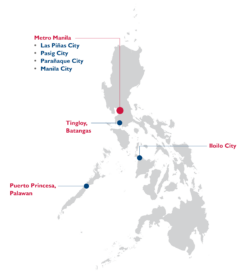
- Metro Manila
- Across Metro Manila, USAID is empowering women to advance in the waste sector through training, mentorship, and the opportunity to receive funding to establish or expand entrepreneurial waste businesses.
- In Pasig City, USAID is transforming local organics and single-use plastics into usable products, such as ocean and climate change-friendly compost and eco-bricks, through a community “Eco Hub.”
- In Parañaque City, USAID supported the design of a new “Eco-Ikot” (Eco-Circular) Center to collect and enable low-value plastics and other waste to be made into new recycled plastic goods, create jobs for local women, and serve as a community education center.
- In Manila City, USAID supported women-owned sari-sari convenience stores to earn additional income as local “waste to cash” stations that buy plastic waste from the community and put it back into a developing local circular economy. USAID partners are also building local government capacity and helping local waste collectors to establish profitable, sustainable waste businesses.
- In Tingloy Island and Batangas City, USAID is supporting a new island-based circular economy and barangay waste management system by strengthening local policies and establishing revenue-generating recovery centers and new local businesses that will support the circular economy.
- In Iloilo City, USAID is building the capacity of waste collectors and aggregators, while helping the local government to implement and monitor new waste management strategies.
- In Puerto Princesa City, USAID is professionalizing informal waste collection to improve safety, livelihoods, and the environmental contributions of local waste collectors, now known as “Eco Warriors.”
Impacts and Results
In the Philippines, program impacts (to date) include:
- Secured over 800 metric tons of plastic and other low-value waste–the equivalent of approximately 76 million plastic bottles– from leaking into the environment through recovery efforts that diverted material from landfills, while supporting local livelihoods and building circular economies.
- Improved solid waste systems and services for nearly 500,000 households, or about 2.1 million people, through support to and partnerships with government entities, local organizations, and businesses.
- Trained nearly 3,000 individuals from local government, informal waste sector, and local organizations to build local capacity for solid waste management planning and programs.
- Formed over 70 partnerships with local government units; private sector partners, including Nestle Philippines and the Coca-Cola Foundation Philippines; and groups including the Metro Manila Development Authority and World Bank, to build sustainable, circular economies.
- Awarded approximately $3.8 million in grant funding and in-kind support to local organizations and governments to implement effective, locally-led solutions.
Program Grantees
- From 2022 to 2024, Associated Resources for Management and Development (ARMDEV) supported CCBO’s Women in Waste’s Economic Empowerment Activity’s Advanced Business Skills training program.
- In 2021, Catholic Relief Services (CRS) partnered with the program to build local (barangay and city) government and private sector capacity for effective solid waste management through trainings covering SWM policy, strategies, waste analysis and characterization studies, and solid waste planning–while supporting communities in the adoption of more sustainable waste management and reduce, reuse, and recycle (the 3Rs) practices. Through a follow on grant, CRS is now supporting local governments to formulate local ordinances, improve the implementation of their local solid waste management plans in partnership with the private sector, and monitor household waste segregation. CRS is also working to increase the income of informal waste workers by strengthening their business management capacities, mobilizing resources, and providing small grants to improve their operations.
- From August 2022 to April 2023, the Central Philippines University conducted research on household waste generation, the waste value chain, and local waste behaviors in Iloilo City and is now using the findings to support local governments in enhancing solid waste management systems across 18 barangays, strengthening compliance with national policy, and designing and implementing waste management plans for over 20 barangays along significant waterways.
- In 2021 and 2022, Communities Organized for Resource Allocation (CORA) worked to establish and pilot a new “Circular Center” model, located within an existing city material recovery facility that was limited in processing large volumes of recyclable materials. The model was designed to capture and give new life to plastics and other waste gathered from regular beach clean-ups, as well as from local households and businesses, as a model that can be adopted by and scaled to other cities.
- From 2022 to 2024, EcoWaste Coalition (EWC) supported the program’s Women in Waste’s Economic Empowerment Activity to empower women both at the lowest rungs of the SWM value chain and those working in upcycling by providing training in business, gender and personal empowerment skills, access to financing to start or expand SWM/3R business, and continued mentoring and coaching.
- From 2020 to 2024, Green Antz worked to address plastic pollution by improving the collection, segregation, sorting and recycling systems at the barangay level. The project built an integrated waste management system through the establishment of a community EcoHub. The Hub processes organics and single use plastics to turn them into usable products managed by a team of facility and collection staff.
- In 2021 and 2022, Plastic Credit Exchange (PCX) piloted its Aling Tindera Network model with Clean Cities, Blue Ocean to address plastic waste in the City of Manila. The project established ten Aling Tindera stations by engaging women micro-entrepreneurs who own sari sari stores–small, home-based convenience stores. The sari saris serve as community collection points for plastic waste where community members can bring and sell their plastic in exchange for cash. The grant outfitted the sari sari stores with container vans, scales, and balers to condense the plastic–preparing it for PCXs offtake partners who recycle and transform the plastic waste.
- From 2022 to 2024, the Philippine League of Local Environment and Natural Resources Officers, Inc. (PLLENRO) strengthened the capacity of various stakeholders in solid waste management to manage and prevent ocean-bound plastics by reviewing gaps in waste management capacity and design, as well as implemented capacity building programs to assist five local governments to revise or formulate comprehensive waste management plans that contribute to a circular economy framework.
- From 2021 to 2024, Project Zacchaeus (PZC) worked with waste collectors from the community of Barangay Bancao-Bancao, which has over the last years provided critical waste management services for the area with little resources and representation. Through USAID’s grant, Project Eco-Kolek transformed these waste collectors into “Eco Warriors” through training on proper waste management, health and safety, and–most of all– leadership skills that have empowered the waste collectors and emphasized their important role in the community.
- From 2022 to 2024, Pure Oceans piloted an island-based circular economy model, working with community residents, barangays, and the local government to strengthen plastic waste management on Tingloy Island, establish revenue-generating waste recovery centers, and support plastic waste reduction enterprises like the Soli Soli (refillable product stores) in select communities.
- From 2022 to 2024, WWF-Philippines worked to establish a barangay waste management system in Batangas City that is participatory and value-driven, as well as supported the development of local policies and regulations that are inclusive of the voice and needs of the community, empowering youth to participate in solid waste management, and enabling members of the informal waste sector to access improved livelihood opportunities.
Women in Waste’s Economic Empowerment Activity
In the Philippines, the program’s Women in Waste’s Economic Empowerment (WWEE) Activity works to empower women at the lowest rungs of the solid waste and recycling sectors to establish or expand their waste livelihoods and businesses. Learn more.
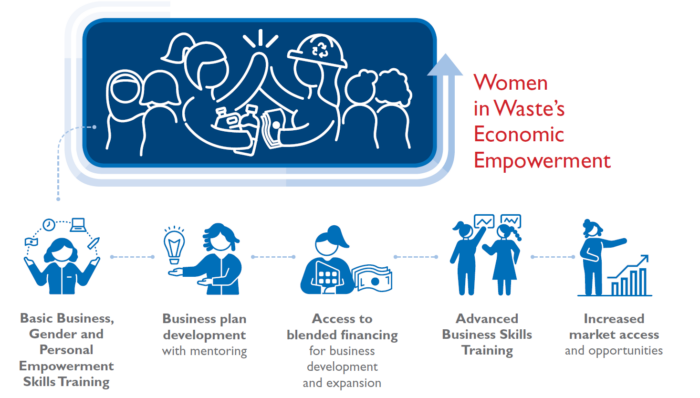
Insights & Updates
See All Insights & Updates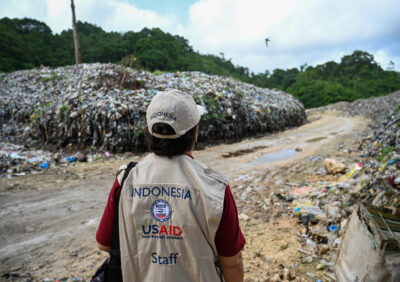
Preventing More Than One Million Tons of Plastic from Entering the Environment
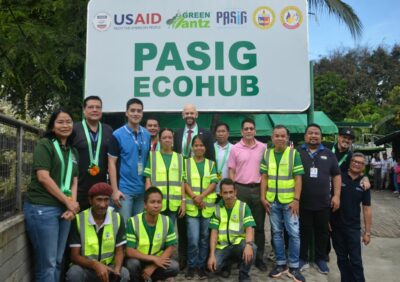
U.S. Inaugurates Php 14-Million Modern Recycling Facility in Pasig City
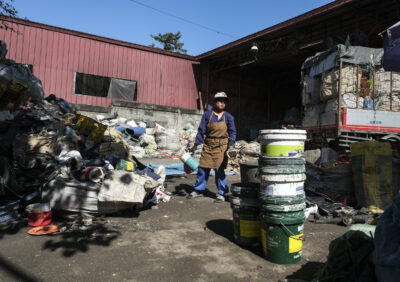
Six Ways USAID is Advancing Gender Equality in the Waste Sector
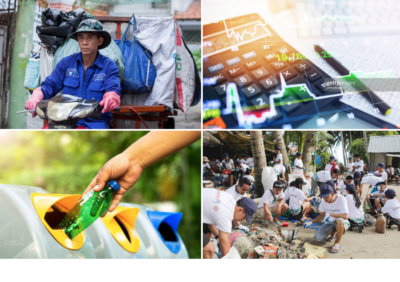
CCBO Launches New Capacity Building Tool for Local Governments
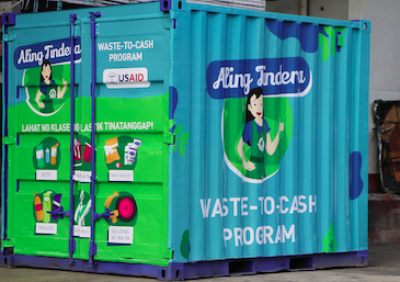
Women in the Waste Sector: Unlocking Global Climate Gains through Local Action
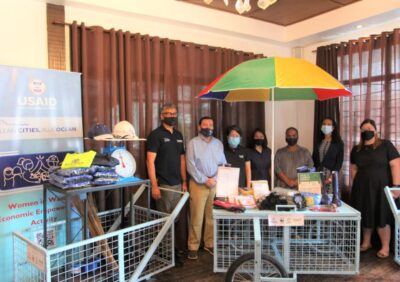
USAID and Partners Award Grant to Woman Waste Collector
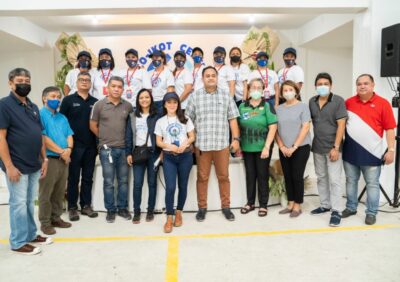
U.S., CORA Launch Center to Fight Ocean Plastic Pollution in Parañaque City
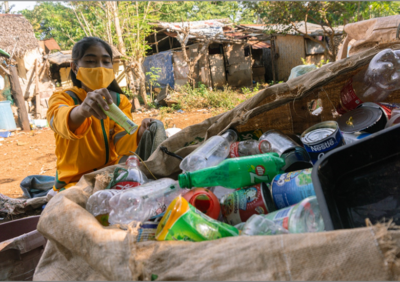
Outfitting Waste Workers: Testimonies of a Safer, More Equitable Waste Sector in the Philippines
